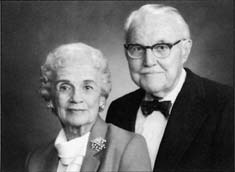 Baltimore native EDWARD J. SCHAEFER graduated from The Johns Hopkins University in 1923 with a bachelor’s degree in electrical engineering. He joined General Electric after completing his undergraduate studies. In 1944, he and a partner founded the Franklin Electric Company, a manufacturer of submersibles, motors, and packaging and weighing equipment. Under his leadership as chief executive officer and chairman, the firm in Bluffton, Indiana, expanded to include four plants in the U.S. and three overseas. Today, Franklin Electric has grown into a multi-million-dollar global provider of complete water systems and fueling systems. The company now has 14 manufacturing and distribution facilities worldwide.
Baltimore native EDWARD J. SCHAEFER graduated from The Johns Hopkins University in 1923 with a bachelor’s degree in electrical engineering. He joined General Electric after completing his undergraduate studies. In 1944, he and a partner founded the Franklin Electric Company, a manufacturer of submersibles, motors, and packaging and weighing equipment. Under his leadership as chief executive officer and chairman, the firm in Bluffton, Indiana, expanded to include four plants in the U.S. and three overseas. Today, Franklin Electric has grown into a multi-million-dollar global provider of complete water systems and fueling systems. The company now has 14 manufacturing and distribution facilities worldwide.
During his lifetime, Mr. Schaefer was a fellow of the American Institute of Electrical Engineers and held 80 U.S. patents. He served a term on The Johns Hopkins University Board of Trustees and was honored in 1978 with the university’s Distinguished Alumnus Award. Mr. Schaefer played a key role in the establishment of the Whiting School of Engineering as a member of the six-person ad hoc committee, chaired by Willard Hackerman, Engr 1938, that, in 1977, recommended and orchestrated the opening of a separate school of engineering.
Mr. Schaefer continued to work full time until his death in 1991 at the age of 90. He was predeceased by his wife of 59 years, HILDEGARDE SCHAEFER, who died in 1987. The Edward J. Schaefer Professorship in Electrical Engineering is one of two endowed professorships generously provided to the Whiting School by Mr. and Mrs. Schaefer to support the engineering faculty.
Held by Sharon Gerecht
 SHARON GERECHT, Ph.D., professor of chemical and biomolecular engineering and director of the Johns Hopkins Institute for NanoBioTechnology (INBT), is an internationally recognized expert in vascular and stem cell biology and engineering.
SHARON GERECHT, Ph.D., professor of chemical and biomolecular engineering and director of the Johns Hopkins Institute for NanoBioTechnology (INBT), is an internationally recognized expert in vascular and stem cell biology and engineering.
Gerecht’s research group studies the interactions between stem cells and their microenvironments with the long-term goal of engineering artificial cell microenvironments capable of guiding vascular differentiation, delivery, and regeneration. The research program is based on the integrated and advanced use of tissue engineering system components and is grounded in the fundamentals of interfacial science and engineering and stem cell biology.
Gerecht pioneered the use of engineering fundamentals to understand and harness vascular fate decisions of stem cells, leading to both basic knowledge and future therapeutics. Her lab was the first to design/develop/engineer biomaterials to guide vascular morphogenesis through activation of cellular pathways required for vacuole formation and merging into large lumen, sprouting, and eventual network formation. In the area of hypoxia, the group developed a hydrogel to better control variations in oxygen levels. Her work has led to the establishment of a novel line of research dedicated to understanding how dissolved oxygen regulates stem cell differentiation and cancer growth.
What sets Gerecht’s approach apart is its emphasis on understanding cells and tissues and how they function and using that information to engineer systems. While the typical tactic had been to design materials and then test them in cells, Gerecht’s research group came at the challenge from a different direction, studying how vasculature forms and how tissues interact with the extracellular matrix. She then has been able to bioengineer materials to use similar signaling and mimic the interactions in vitro. This innovative approach has rippled across the field; more researchers are now working first to understand the requirements of the tissues they work with, and then translate those findings into the systems they engineer.
Gerecht is the recipient of the Allan C. Davis Medal from the Maryland Academy of Sciences (2008); the North America Vascular Biology Organization Junior Investigator Award (2009); the Basil O’Connor Starter Scholar Research Award from the March of Dimes Foundation (2009-2011); the National Scientist Development Award (2008-2012) and Established Investigator Award (2014-2019), both from the American Heart Association; the National Science Foundation CAREER award (2011-2016); the W.W. Smith Charitable Trust Heart award (2014-2017); and the JHU Inaugural President’s Frontier Award (2015). She is an elected Fellow of the American Institute for Medical and Biological Engineering (2016) and the author of more than 140 papers, book chapters, and patents in her field. Gerecht is a co-founder of Gemstone Biotherapeutics, LLC, a spin-off company based on technologies developed in her lab, focusing on wound healing.
Gerecht earned her B.A. in biology at the Israel Institute of Technology in 1994, her M.Sc. in medical sciences from Tel-Aviv University in 1999, and her Ph.D. in bioengineering from the Israel Institute of Technology in 2004. She was a post-doctoral researcher at the Massachusetts Institute of Technology.
 Baltimore native EDWARD J. SCHAEFER graduated from The Johns Hopkins University in 1923 with a bachelor’s degree in electrical engineering. He joined General Electric after completing his undergraduate studies. In 1944, he and a partner founded the Franklin Electric Company, a manufacturer of submersibles, motors, and packaging and weighing equipment. Under his leadership as chief executive officer and chairman, the firm in Bluffton, Indiana, expanded to include four plants in the U.S. and three overseas. Today, Franklin Electric has grown into a multi-million-dollar global provider of complete water systems and fueling systems. The company now has 14 manufacturing and distribution facilities worldwide.
Baltimore native EDWARD J. SCHAEFER graduated from The Johns Hopkins University in 1923 with a bachelor’s degree in electrical engineering. He joined General Electric after completing his undergraduate studies. In 1944, he and a partner founded the Franklin Electric Company, a manufacturer of submersibles, motors, and packaging and weighing equipment. Under his leadership as chief executive officer and chairman, the firm in Bluffton, Indiana, expanded to include four plants in the U.S. and three overseas. Today, Franklin Electric has grown into a multi-million-dollar global provider of complete water systems and fueling systems. The company now has 14 manufacturing and distribution facilities worldwide.